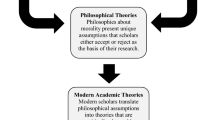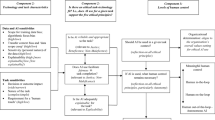Abstract
It has been claimed that (1) computer professionals should be held responsible for an undisclosed list of “undesirable events” associated with their work and (2) most if not all computer disasters can be avoided by truly understanding responsibility. Commentators of “A Critique of Positive Responsibility in Computing” argue that this is not Donald Gotterbarn’s view (Gotterbarn, JSEE 14(2):235–239, 2008) but that a critique of the view nevertheless raises significant moral issues within computing such as the ethical goals of a computing profession, the appropriate ethical stance toward bugs, and the public good with respect to computing (Miller, JSEE 14(2):245–249, 2008). Commentators also argue that “A Critique”’s “profitable misreading” demonstrates the “moral ecology” of organizations “dedicated narrowly to financial success” and that other “moral ecologies” that are customer or quality driven can be shown to be more important or preeminent (Huff, JSEE 14(2):241–244, 2008). It is argued here that (1) the hyper-inflated reading of Gotterbarn’s and Ladd’s views on positive responsibility persists despite Gotterbarn’s explicit rejection of it, and that (2) such a reading of positive responsibility cannot be placed within a single moral ecology, nor can a single moral ecology be shown to be any more important or preeminent than others.
Similar content being viewed by others
References
Stieb, J. A. (2008). A critique of positive responsibility in computing. Science and Engineering Ethics, 14(2), 219–233. doi:10.1007/s11948-008-9067-4.
Gotterbarn, D. (2001). Informatics and professional responsibility. In T. W. Bynum & S. Rogerson (Eds.), Computer ethics and professional responsibility (pp. 107–118). Malden, MA: Blackwell. Originally in (2001) Science and Engineering Ethics, 7, 221–230.
Gotterbarn, D. (2000). You don’t have the right to do wrong! Resource Document. Donald Gotterbarn. http://csciwww.etsu.edu/gotterbarn/. Accessed 11, September 2008.
Joch, A. (1995). How software doesn’t work. Byte, 20(4), 48–60.
Fieser, J. (2006). Ethics. Resource document. Internet Encyclopedia of Philosophy. http://www.iep.utm.edu/e/ethics.htm#SSH1b.i. Accessed 14 March 2008.
Author unknown (2003). Altruism. Resource Document. The Free Dictionary. Farlex. http://www.thefreedictionary.com/altruism. Accessed 28 March 2008. Quoted from (2000) The American heritage dictionary of the English language, fourth edition. New York: Houghton Mifflin.
Ladd, J. (1989). Computers and moral responsibility: a framework for an ethical analysis. In C. C. Gould (Ed.), The information web: Ethical and social implications of computer networking (pp. 207–227). USA, Westview: Boulder, CO.
Machan, T. (2001) The perils of positive rights. Resource Document. The freeman: Ideas on liberty 51(4). Foundation for economic education publications. http://www.fee.org/Publications/the-Freeman/article.asp?aid=2993. Accessed 11 September 2008.
Gotterbarn, D. (2008). ‘Once more into the breach’: Professional responsibility and computer ethics. Science and Engineering Ethics, 14(2), 235–239. doi:10.1007/s11948-008-9071-8.
Miller, K. W. (2008). Critiquing a critique. Science and Engineering Ethics, 14(2), 245–249. doi:10.1007/s11948-008-9072-7.
Perrow, C. (1999). Normal accidents: Living with high-risk technologies. Princeton, NJ, USA: Princeton University Press.
Huff, C. (2008). It is not all straw, but it can catch fire: In defense of impossible ideals in computing. Science and Engineering Ethics, 14(2), 241–244. doi:10.1007/s11948-008-9069-2.
Davis, M. (1998). Ordinary technical decision making: An empirical investigation. In M. Davis (Ed.), Thinking like an engineer: Studies in the ethics of a profession (pp. 119–156). New York: Oxford University Press.
Parnas, D. L. (1991). SDI: A violation of professional responsibility. In D. Johnson (Ed.), Ethical issues in engineering (pp. 15–25). New Jersey: Prentice Hall.
Acknowledgments
I would like to thank Profs. Gotterbarn, Miller and Huff for their comments on “A Critique of Positive Responsibility in Computing.” Thanks are due also to Stephanie Bird and the staff at Science and Engineering Ethics for providing a great forum for the exchange of critical ideas on ethics within science and engineering.
Author information
Authors and Affiliations
Corresponding author
Additional information
Stieb, J. A. (2008). A critique of positive responsibility in computing. Science and Engineering Ethics, 14(2), 219–233.
Rights and permissions
About this article
Cite this article
Stieb, J.A. Response to Commentators of “A Critique of Positive Responsibility”. Sci Eng Ethics 15, 11–18 (2009). https://doi.org/10.1007/s11948-008-9101-6
Received:
Accepted:
Published:
Issue Date:
DOI: https://doi.org/10.1007/s11948-008-9101-6




